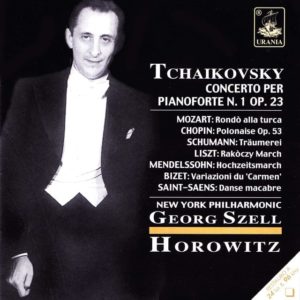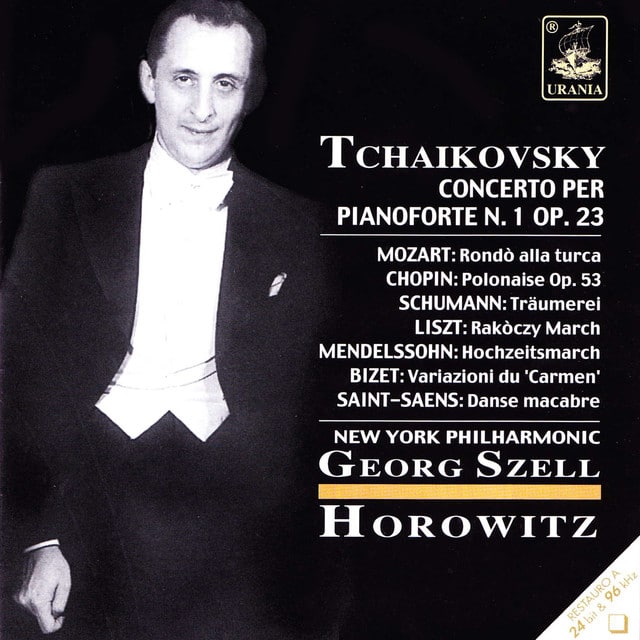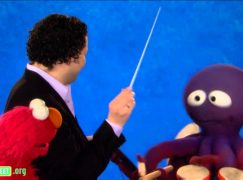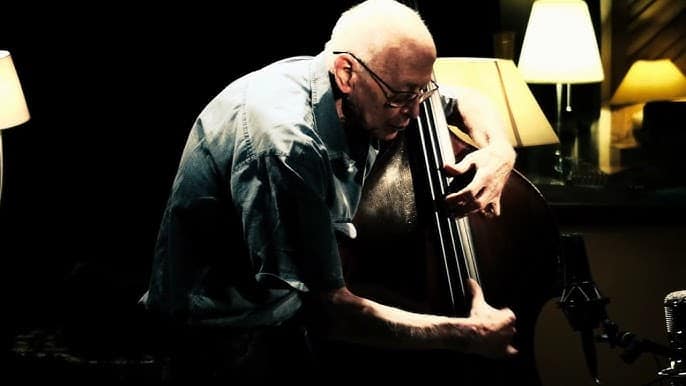Did George Szell tip Vladimir Horowitz over the edge?
mainAn essay by Bernard Horowitz in a Sony Horowitz box raises the possibility that a remark by the conductor was the straw that broke the pianist’s already fragil grip on his mental health.
Bernard Horowitz (no relation) has documents from the pianist’s archive to substantiate the allegation.
Certainly, Szell and Horowitz were chalk and cheese. But did one drive the other clinically mad?
Read here.







It seems like Norman has ‘a thing’ about George Szell. I assure you, he was nothing compared to Fritz Reiner (not musically, but as a difficult person).
Bernard is the son of Joseph Horowitz, whose post on this very matter we received in our email earlier this morning, did we not? Well, I did.
Fascinating read. Horowitz (fils) may be onto something here… Although I recall a similar tug-of-war between Horowitz and Beecham when performing the same piece.
I recall CBS “60 minutes” correspondent Mike Wallace running the “mad” rumor past Horowitz when he interviewed him in the 70s
https://www.youtube.com/watch?v=jgm9uUiqZEg
Frankly this is clutching at straws. Horowitz was prone to mental instability anyway.
by all accounts Mr Szell was not an easy man to get along with but when all is said and done he got terrific results from the Clevland orchestra and made it into the best orchestra inthe USA,a few years ago i first heard this performance of the Tchaikovsky and its quite simply the best performance i have ever heard Szells accompanyment to Horowitz is superb and of course Horowitz,s playing is stunning much better than with his father in law
I had an opportunity to talk with Barry Tuckwell. The subject of conductors came up wrt Van Zuweden. Tuckwell said the Szell was a demanding conductor, but not a petty dictator.
Horowitz’ more idolatrous fans have taken Szell to task for the fact that the piano and orchestra are not *quite* together at the end. But Horowitz’s Golden Jubilee Rachmaninoff 3rd record was extensively edited because he and the orchestra were not together, and Ormandy was known as a sympathetic and supportive accompanist. One critic who was present at the actual concert said the dis-coordination often made the piece sound “startlingly modern.”
It’s an extraordinary performance and particularly exciting to hear Szell and the NYPO scrambling to catch up in the last few bars.
There is a 1948 performance of this concerto by Horowitz and the NY Phil conducted by Bruno Walter that is more satisfying, i.e., not as manic, in my opinion. It is on YouTube.
In my opinion, this “article” says more about the authors Horowitz lack of scholarship than it does VH or GS. First, musically the notion that GS was an odd choice to lead a NYP gala on short notice, especially one with a “star” soloist, is at best uninformed. Without checking the archives I’d be willing to wager that from the 1950’s until his death in 1970 no other conductor guest-conducted the NYP more frequently than GS. Furthermore, even in what many consider to be the golden-age of conductors no one was a more committed or able conductor of concerti than GS. From his seminal recording in the 1930’s of the Dvorak concert with Casals until one of his last recordings, the Brahms Double with Oistrakh & Rostropovich, no one championed the genre like GS. Second, the statement that GS was a poor or unlikely choice to conduct the Tchaikovsky 1st seems equally uninformed. His recordings of the composer have been largely enthusiastically reviewed and as for the concerto in question, I would urge anyone interested to listen to the recording he made in Cleveland with Gary Graffman.
As to the notion that Szell’s comment about a painting pushed VH over the edge psychologically, I’ll leave it to the psychologists and psychiatrists to weigh-in. That said, on the surface, it seems absurd to suggest that a man widely reported living a closeted life, a component of which then and now was criminal was finally broken by a snide comment about a painting.
A number of comments on your comment, Amos:
You are absolutely right that GS was an able and marvelous conductor of concerti (although I would personally give Ormandy the nod as being even better).
Szell was fully equipped to be an “emergency” conductor. He knew the standard repertoire – both orchestral and concertante – by memory, backwards and forwards, and commanded a conducting technique developed enough to allow him to drop in at a moment’s notice and give a fully realized musical performance (unlike a certain Gergiev who will remain unnamed).
And as for your statement “it seems absurd to suggest that a man widely reported living a closeted life, a component of which then and now was criminal was finally broken by a snide comment about a painting”, you are again absolutely right.
In a comment on the posting on Joe Horowitz’ blog (the link provided above by Norman), Tully Potter writes:
“Horowitz was always very fragile. He first retired from the concert hall as early as the 1930s and was helped back into the public arena by his friends Adolf Busch and Rudolf Serkin. On 26 September 1938 at Zurich, Busch made space in a Busch Quartet concert for Horowitz, who had not given a concert for two years, to play the Schumann Fantasy (in the event he substituted a Chopin group at the last minute, another sign that he was still not robust mentally). The concert went well and he was all right until the early 1950s.”
My own personal opinion is that as pianist and musician, Horowitz, as fine as many may think he was, has always been overrated.
Szell must have been a great actor – for a man who supposedly “loathed” the Tchaikovsky concerto he sure conducted it well. Besides the electrifying Horowitz recording, his studio version with Gary Graffman is still, as one reviewer put it, “pure gold”.
Can we just enjoy Horowitz’s artistry without wasting time speculating on whether he went nuts? And, as by 1953 it was common knowledge that Szell was a complete SOB, its highly unlikely that VH walked into that engagement naively and just put his head under Szell’s ax. Certainly VH was the bigger star on that occasion, and no doubt the petty, insecure Szell was resentful of him, but let’s not give Szell the credit for pulling VH off the concert stage for 12 years.
Read the article. He agreed to work with Mitropoulos. “But When Dmitri Mitropoulos suffered a heart attack, Szell was (inexplicably) chosen by the New York Philharmonic to partner Horowitz in Tchaikovsky’s B-flat minor Piano Concerto..”
Horowitz could have cancelled. He was, after all, Horowitz. And Szell wasn’t “inexplicably” chosen – he was available that day and was the best & biggest name they could get.
Someone once said of Szell “he is his own worst enemy.” Upon hearing that, Rudolf Bing said, “not as long as I am alive”!
I love the story that when Birgit Nilsson had to fill in her income tax form and came to the question “Do you have any dependants?”, she said that she put Bing‘s name in the box.
The book of Szell anecdotes, Tales from the Locker Room, impels one to the inescapable conclusion that Szell drove everyone over the edge. However, that 1953 Tchaikovsky is an electrifying performance from both pianist and conductor, deservedly celebrated.
Yep, one of the most electrifying Tchaikovsky Firsts to survive on records. If Szell and Horowitz weren’t getting along, they appear to channeled that conflict into *drama* in the music.
By all accounts, Szell could be a pill, but I seriously doubt even he could drive Horowitz to have a breakdown.
I wasn’t there; I can’t vouch for the veracity. But in my experience my teacher, Lillian Fuchs was not at all a fabulist. She told me once that she and Szell were both judges for the Leventritt competition in 1964, the year Perlman won. Szell voted for him very reluctantly, according to Lillian, even though he had clearly played the best. “What is the point?” he asked her. There is no possibility that this cripple will ever have a career!
A less malevolent recollection would have been Szell saying ” he’s crippled he has no chance for a solo career”. But it better suits the sob persona to recall it as you do. Other than the prestige the reward for winning the Leventritt was the guarantee of concerts with major American orchestras. In 1964 “handicap” access to concert halls was non-existent, as I recall early in his career IP often had to use the freight elevator to enter halls, and public sentiment was not embracing (does anyone think that FDR would have been elected if his polio was documented with crutches). That IP overcame these impediments only makes his accomplishments that much more impressive. Last, at the end of the day Szell opted to let the virtuosity of the playing take precedence over any doubts as to the utility of the award.
Sorry I forgot to add that Ms. Fuchs might not be the most impartial judge wrt GS. When Szell became music director in Cleveland one of his first personnel moves was to remove her brother Harry as principal cello. Rather than move he opted to resign.
Something’s off about Joe Horowitz’ hyping of his son’s liner note which can only be read by buying the set. Nepotism and BS.
Funny. The Szell-Horowitz achaikoswsky is often upheld as saner and more balanced than the “hysterical” Toscanini-Horowitz. It is in better sound.
Szell was a very good pianist himself. When Curzon fluffed a passage in the Brahms first several times and left the recording studio for a break, Szell sat at the piano and played the passage from memory. Looking up, he said, “What’s so hard about that?”
Not exactly to the point of this article, but I am reminded by a comment the inimitable Oscar Levant said about himself: “there is a thin line between genius and madness and I have erased it”.
Horowitz was quite capable of irritating conductors himself. I recall that video made of Mozart’s 23rd piano concerto in A major with Carlo Maria Giulini … the expression on the conductor’s face as he has to endure the childish antics – which he does with Olympian dignity.
Horowitz really is indispensable for Tchaikovsky/s first, in some version … the earliest live finale from Denmark on Danacord, live Barbirolli, studio Toscanini, live “War Bond” Toscanini, or Szell.
If I had never heard Horowitz, I’d have no idea how effective it can be. Matsuev, Alexei Sultanov, and Rubinstein approached him. And the “interesting Weissenberg, Richter, Cziffra, Cliburn, and Igor Zhukov,
The wonder is that Tchaikovsky himself could have played it at all for Nikolai Rubinstein, the intended but withdrawn dedicatee after he condemned it at that first hearing.
I just realized something – all of the amusing comments y conductors and soloists at at. Least 50-60 years old.
My favorite supposedly happed during a rehearsal led bu Becham. He stopped the rehearsal and said, 2nd horn youe’r c..oming in one beat late. The rehearsal started over and stopped and again. Becham stopped and 2nd horn, you’re coming in one beat late. Finally the principal horn called Sir Thomas the 2nd has to miss todays rehearsal and Becham replied, “When he comes back, tell him he’s entering one beat late”.